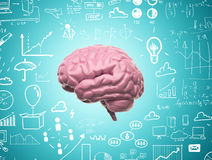 From ScienceDaily:
From ScienceDaily:
Humans have extraordinarily large brains, which have tripled in size in the last few million years. Other animals also experienced a significant, though smaller, increase in brain size. These increases are puzzling, because brain tissue is energetically expensive: that is, a smaller brain is easier to maintain in terms of calories. Building on existing research on learning, Muthukrishna and colleagues analytically and computationally modeled the predictions of the cultural brain hypothesis and found that this theory not only explains these increases in brain size, but a variety of other relationships with group size, learning strategies, knowledge and life history.
The theory relies on the idea that brains expand to store and manage more information. Brains expand in response to the availability of information and calories. Information availability is affected by learning strategies, group size, mating structure, and the length of the juvenile period, which co-evolve with brain size. The model captures this co-evolution under different conditions and also describes the specific and narrow conditions that can lead to a take-off in brain size — a possible pathway that led to the extraordinary expansion in our own species. The authors called this set of predictions the cumulative cultural brain hypothesis. These theories were supported by tests using existing empirical data. Taken together, the findings may help explain the rapid expansion of human brains and other aspects of our species’ life history and psychology.
“This is a brand-new theory to explain the evolution of the human brain as well as brains more generally. It shows how various characteristics of a species are actually intrinsically connected through a common evolutionary process,” says Muthukrishna. “The limits to larger brains is our ability to birth them, but as this theory suggests, this process is ongoing — we’re now expanding our juvenile period, hitting a new biological limit in our ability to reproduce at an older age.” Paper. (open access) – Muthukrishna M, Doebeli M, Chudek M, Henrich J. The Cultural Brain Hypothesis: How culture drives brain expansion, sociality, and life history. PLoS Comput Biol, 2018 DOI: 10.1371/journal/pcbi.1006504 More.
Humans have certainly expanded the amount of information available to us explosively in the last few decades, and significantly in the last few thousand years. But it’s unclear that the amount of information a chimpanzee or a crow living in the wild needs has changed much at all. Thu7s, the theory might be easier to consider if we left non-humans out of the account for now.
To the extent that this is a theory intended to account for the evolution of the human brain, it has a lot of competition:
Some say we evolved large brains alongside small guts, but another research team found no such correlation. Alternatively, fluid societies (relative to chimps) explains it. And, according to some, mental illness helped. Chimpanzees’ improved skills throwing excrement are also said to provide hints about human brain development. (The ability to throw projectiles at very high speeds is apparently unique to humans.) Our ancestors had to grow bigger brains anyway, we are told, to make axes and hunt something besides elephants. Collective intelligence (“ideas having sex”), whatever that means, has been really important to human evolution as well.
The obvious problems with all of these disunited and discordant theses can be summed up for convenience as: 1) If some aspect of chimpanzee behavior explains matters, why didn’t it produce the same result in chimpanzees? 2) If mere advantage (which every primate seeks) explains a development like the human mind, why did only humans experience it?The above is only a selection from the claims advanced for one isolated hook or another on which key parts of our fragile humanity are said to suspend. A vast, interlocking pattern of timed hooks forming a design would better account for the evidence, but it wouldn’t be Darwin. Darwinian theory, by its very nature, demands this zealous emphasis on isolated, randomly generated characteristics or events — warring trivia, basically. And we haven’t even got to language or society yet. More.
Just about anything that a theorist thinks is righteous or plausible or defensible can be said in polite company to promote the evolution of the human brain. So the answer to the title question (“Can culture explain why brains have become bigger?”) is: Yes. Your ticket is #17.
Follow UD News at Twitter!
See also: Do big brains matter to human intelligence?
Software pioneer says general superhuman artificial intelligence is very unlikely. The concept, he argues, shows a lack of understanding of the nature of intelligence. François Chollet, author of Keras, for the Python deep learning language, cites the No Free Lunch theorem as one of the reasons.
and
Researchers find loneliness is hard on the brain What we think about our lives really does affect our health. What’s less often recognized is that loneliness could cause be a cause of brain damage as well, at least if we go by rodent studies.